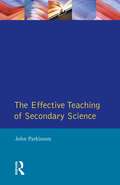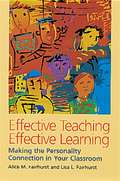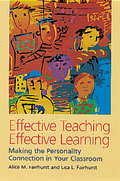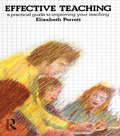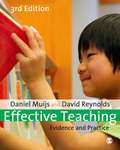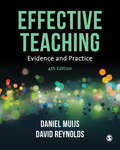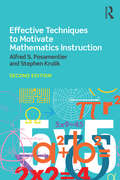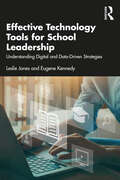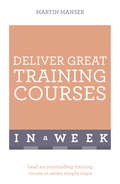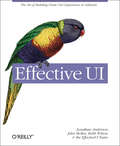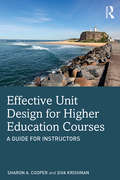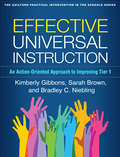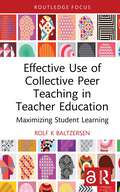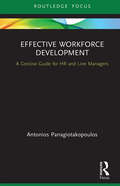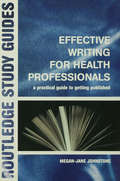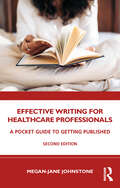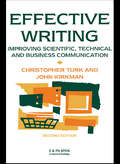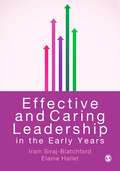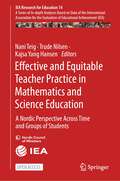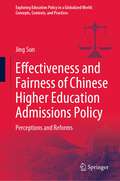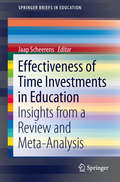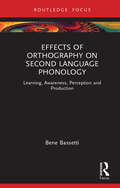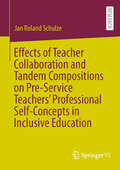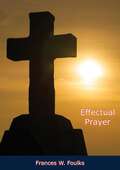- Table View
- List View
Effective Teaching of Secondary Science, The (Effective Teacher, The)
by John ParkinsonThe Effective Teaching of Secondary Science encourages the trainee teacher to develop effective skills for teaching science to secondary school pupils. The comprehensive coverage of topics and issues provides good foundations for trainee teachers who are encouraged to test and evaluate different techniques. Practical advice is offered in areas such as lesson planning, the preparation of worksheets, planning practical activities and safety in the laboratory. The book also discusses the use of information technology as well as multicultural and gender issues and the teaching of pupils with special needs.Much of the work covered is undepinned by areas of educational research such as educational theory and psychology and sociology of education. Information on the requirements of the national curriculum and on post-16 science courses is given and includes a number of assessment techniques for the problematic area of assessing science attainment target 1.
Effective Teaching, Effective Learning: Making the Personality Connection in Your Classroom
by Alice M. Fairhurst Lisa L. FairhurstWritten to help teachers develop more effective strategies for working with their students, this book explores the teaching and learning styles for the sixteen MBTI© personality types. Teachers learn to identify the strengths and limitations of their own styles and are given practical advice on how to reach students whose learning styles differ from their favored teaching method. Also included are specific steps for handling conflict, academic problems, and interpersonal issues as well as suggestions for matching instructional materials and methods to learning styles.
Effective Teaching, Effective Learning: Making the Personality Connection in Your Classroom
by Alice M. Fairhurst Lisa L. FairhurstDrawing on contemporary psychological insights, this book shows how both teaching and learning styles are rooted in the dynamics of personality. By opening the door to a whole range of teaching techniques addressing the personality needs of different students, Effective Teaching, Effective Learning will prove an invaluable aid to classroom teachers, parents, school psychologists, counselors, administrators, and all those concerned with contemporary educational issues. Filled with practical, concrete suggestions, this book: clarifies the strengths and weaknesses of different teaching and learning styles, helps teachers get more satisfaction out of teaching by identifying new ways to reach students with various learning styles, matches the different types of learners with the teaching approaches and materials most likely to work for them, provides specific steps for handling conflict, discipline, and academic and interpersonal issues.
Effective Teaching: A Practical Guide to Improving Your Teaching
by Elizabeth PerrottThis book is a practical guide designed for teachers and trainee teachers to help them improve their teaching skills. It presents a concise and readable introduction to the basic techniques and procedures required in the classroom together with practical exercises designed to develop skills.
Effective Teaching: Evidence and Practice
by David Reynolds Daniel Muijs'This book draws on an impressive range of research to inform the reader how teaching in schools can be made more effective. . . . The book has a great deal to offer both new and experienced teachers. It is an excellent guide for teachers in pursuit of ways to achieve more effective teaching' - Jeng-Chyan Chen,Taipei Municipal University of Education `A small number of education books feel indispensable; this is warmly welcomed to the club. It's a magnificent survey of what educational research can tell us about nitty-gritty classroom issues' - Geoff Barton, Times Educational Supplement, Friday Magazine Research into student learning and achievement shows that classroom teaching is at the heart of the process of schooling. What teachers do in the classroom is the factor that most strongly affects pupils' progress in school. In their 2001 book, David Muijs and David Reynolds reviewed what is now a large body of knowledge on effective teaching. This new edition of Effective Teaching, Evidence and Practice updates the successful 2001 volume with the latest research on effective teaching and learning. Following user feedback, a number of chapters have been added to reflect reader needs and developments in the field since 2001. Chapters on student learning, collaborative small group work, constructivism and effective science teaching have been added, as well as updates to all other chapters. The user-friendly style and broad coverage that were strengths of the previous edition are maintained, as is the three part structure focussing on generic teaching skills, teaching for specific goals and subject specific strategies and other classroom issues. Like the first edition, it is essential reading for students of education, teachers and educational researchers.
Effective Teaching: Evidence and Practice
by Professor David Reynolds Professor Daniel MuijsThis new edition of the popular textbook digs into the research behind different aspects of teaching in order to give students an informed understanding of what underpins high quality teaching. It explores what the evidence shows about the effectiveness of different approaches, drawing from a variety of educational schools of thought. New to this edition: enhanced discussion of what we can learn from cognitive science research new chapters on metacognition and thinking skills, teacher subject knowledge, evaluating teacher performance, and international comparisons on teaching new Further Reading and Think Point features encouraging critical engagement with key research findings. This is essential reading for all students on initial teacher education courses including undergraduate, postgraduate, School Direct, Teach First and employment-based routes into teaching, and also qualified teachers wanting to deepen their understanding of educational research.
Effective Teaching: Evidence and Practice
by Professor David Reynolds Professor Daniel MuijsThis new edition of the popular textbook digs into the research behind different aspects of teaching in order to give students an informed understanding of what underpins high quality teaching. It explores what the evidence shows about the effectiveness of different approaches, drawing from a variety of educational schools of thought. New to this edition: enhanced discussion of what we can learn from cognitive science research new chapters on metacognition and thinking skills, teacher subject knowledge, evaluating teacher performance, and international comparisons on teaching new Further Reading and Think Point features encouraging critical engagement with key research findings. This is essential reading for all students on initial teacher education courses including undergraduate, postgraduate, School Direct, Teach First and employment-based routes into teaching, and also qualified teachers wanting to deepen their understanding of educational research.
Effective Techniques to Motivate Mathematics Instruction
by Alfred S. Posamentier Stephen KrulikEffective Techniques to Motivate Mathematics Instruction offers pre-and in-service teachers best practices and techniques that can be used to motivate students in the first few minutes of any lesson in mathematics. Veteran teacher educators Posamentier and Krulik show how a bit of creativity and planning up front pays back by enabling a successful lesson on even the most challenging mathematics topic. Organized around nine different motivational techniques, each chapter includes a variety of illustrative examples of how the technique may be applied. Designed to complement any methods textbook, this practical, accessible guide helps future math teachers ease the transition from successful student to successful teacher by developing the tools needed to create motivational introductions in their classes.
Effective Technology Tools for School Leadership: Understanding Digital and Data-Driven Strategies
by Leslie Jones Eugene KennedyThis book prepares educational leaders with the knowledge needed to critically evaluate, select, and use technological tools to be effective school leaders. Authors Jones and Kennedy explore the technology tools needed to support the full range of responsibilities of a school leader, including management and administration, personnel and evaluation, security and safety, instructional leadership, organizational culture and climate, external relationships, and action research. Each chapter unpacks advantages and pitfalls of various technological tools and includes case scenarios that contextualize these ideas for readers. Chapter content is also aligned with The Professional Standards for Educational Leaders (PSEL), the National Educational Leadership Preparation Standards (NELP), and the International Society of Technology Standard in Education (ISTE) standards. This timely and important book adds to the toolbox for educators preparing to become effective and cutting-edge school leaders.
Effective Training in a Week: Teach Yourself
by Martin ManserLearn in a week, what the experts learn in a lifetime. Sunday: What is training? Monday: Identifying training needs clearly Tuesday: Designing the course carefully Wednesday: Planning variety creatively Thursday: Delivering your training successfully Friday: Evaluate the training thoroughly Saturday: Refine your skills constantly
Effective UI: The Art of Building Great User Experience in Software
by Jonathan Anderson John Mcree Robb Wilson The EffectiveUI TeamPeople expect effortless, engaging interaction with desktop and web applications, but producing software that generates enjoyable user experiences is much harder than many companies anticipate. With Effective UI, you'll learn proven user-experience strategies that will satisfy your clients and customers, drive business value, and increase brand strength. This book shows you how to capture the collaborative and cooperative spirit among designers, engineers, and management required for building engaging software. You'll also learn valuable methods for maintaining focus throughout the process -- whether you're a product manager who needs a clear roadmap, a developer or designer looking for guidance and advocacy, or a businessperson who wants to understand and manage user-experience software initiatives. Learn how to build software that will:Generate engaging and interactive experiences between consumers and businesses, or between businesspeople and their information systems Account for how people work with, think about, and consume information Establish a richer means of collaboration and communication Reduce frustration by streamlining complex tasks and creating processes that are more intuitive Distinguish products, services, and brands to create a competitive advantage Create scalable systems that adapt to changing user needs and behaviors
Effective Unit Design for Higher Education Courses: A Guide for Instructors
by Sharon A. Cooper Siva KrishnanA clear and concise course design is integral to effective student learning in units of study; however, unit design can be a daunting task for academics. Effective Unit Design for Higher Education Courses is a practical resource based on theoretical foundations, designed to assist both professional course designers and academics with varied levels of curriculum design and development experience or background in higher education units and courses. This book provides a variety of practical advice, skills and resources to assist academics in designing curriculum that focuses on enhancing student learning. Readers are given a range of evidence-based developmental tools that challenge some of the currently accepted conventions behind unit design. Appropriate for any skill level, this book is designed to provide an accessible and structured process to design or revitalise high-quality units of study. Chapters cover a range of topics including developing assessment methods, strategies for providing feedback and evaluating unit design. The book has been structured to follow a design process, but as unit design is non-linear, chapters can be read in any order depending on interest or need. An essential guide for curriculum designers of all skill and experience levels, this book will appeal to all higher education academics tasked with an aspect of unit design.
Effective Universal Instruction: An Action-Oriented Approach to Improving Tier 1 (The Guilford Practical Intervention in the Schools Series)
by Sarah Brown Kimberly Gibbons Bradley C. NieblingThis accessible volume helps school leadership teams accomplish the crucial yet often overlooked task of improving universal instruction--Tier 1 within a multi-tiered system of support (MTSS). Strong universal instruction reduces the numbers of PreK–12 students who may need additional services and supports. Providing clear action steps and encouraging guidance, the expert authors present a roadmap for evaluating the effectiveness of Tier 1, identifying barriers to successful implementation, and making and sustaining instructional improvements. In a large-size format with lay-flat binding for easy photocopying, the book includes 27 reproducible checklists, worksheets, and forms. Purchasers get access to a Web page where they can download and print the reproducible materials. This book is in The Guilford Practical Intervention in the Schools Series, edited by T. Chris Riley-Tillman.
Effective Use of Collective Peer Teaching in Teacher Education: Maximizing Student Learning (Routledge Research in Teacher Education)
by Rolf K BaltzersenEffective Use of Collective Peer Teaching in Teacher Education investigates the learning benefits of letting students assume leadership roles in the classroom, emphasizing both theoretical analysis and firsthand empirical research conducted with pre-service teachers. Building on Vygotsky's (1987) sociocultural theory of human learning and research on collective intelligence, this volume introduces peer teaching as a pedagogical practice with a significant and underexplored learning potential. The first part of this book focuses on findings from two separate teacher education programs, while the second analyzes the learning processes through three conceptualized learning positions: peer teacher learning, peer student learning, and collective peer learning. Investigating the balance and interaction of these processes, this book argues that teaching and learning cannot at length be separated from each other and discusses the practical implications of this idea. This book will appeal to researchers, faculty, and teacher educators with interests in theories of learning and international and comparative education. Its crucial insights into how learning can be maximized in the classroom will provide a nuanced picture of the complexity of learning processes.
Effective Workforce Development: A Concise Guide for HR and Line managers (Routledge Focus on Business and Management)
by Antonios PanagiotakopoulosDeveloped for busy HR practitioners and trainers, this book provides a concise guide to the theory and practice of employee training in contemporary organizations. Reflecting the importance of employee development to learning-based organisations in the knowledge economy, it clearly links employee training needs to business development and offers an accessible guide to current theories combined with research-based practical guidance in how to design effective training programs. Covering all the current theories about training and development and the latest thinking about workplace learning interventions, this concise, practical guide will be an essential source for HR practitioners and line managers seeking improve organizational learning and performance.
Effective Writing for Health Professionals: A Practical Guide to Getting Published
by Megan-Jane JohnstoneHealth professionals are increasingly expected to conduct and publish their research, apply for grants, write newsletters, liaise with the media, present conference papers and contribute articles to professional journals. Writing well is an essential professional skill and writing to publish is an important aspect of professional development. But how do you get published? Where do you start? How do you know if your writing is good enough and what can you learn to make it better?Effective Writing for Health Professionals is an invaluable insider's guide to publishing within the health profession, providing handy tips on:· Getting started· The writing process· Winning habits of successful authors · Promoting your work · Author rights and responsibilitiesMany would-be writers - students, administrators, clinicians, managers and academics alike - are often intimidated at the thought of writing. This book will help to overcome this writing block and introduce aspiring authors to the world of writing and publishing in a professional capacity.Written by a best-selling academic author, Effective Writing for Health Professionals provides insights and strategies for publishing designed for nurses, midwives and health professionals.
Effective Writing for Healthcare Professionals: A Pocket Guide to Getting Published
by Megan-Jane JohnstoneThis new edition of Effective Writing for Healthcare Professionals is an invaluable insider's guide to publishing, providing tips and advice for time-poor professionals working in the healthcare sector. But how do you get published? Where do you start? How do you know if your writing is good enough and what can you learn to make it better? Offering an accessible guide to the key issues, this is the perfect book for those who have busy working lives and find the process of writing challenging. It covers issues ranging from getting started to the winning habits of successful authors; from the rights and responsibilities of authors to how to get noticed. This new edition has been updated to include guidance on publishing norms, collaborative digital platforms, social media, and the impact of the COVID-19 pandemic on publishing trends. Written by a best-selling academic author, this is an essential resource for novice writers and healthcare providers interested in publishing their work.
Effective Writing: Improving Scientific, Technical and Business Communication
by John Kirkman Christopher TurkEffective communication is vital to science, engineering and business management. This thoroughly updated second edition with a new chapter on the use of computers and word-processors gives clear, practical advice illustrated with real-life examples on how to select, organize and present information in reports, papers and other documents.
Effective and Caring Leadership in the Early Years
by Elaine Hallet Professor Iram SirajEffective and caring leadership is an essential part of raising standards and increasing the quality of learning in early childhood settings. This book explains leadership practices that can make a positive difference to the provision offered and improve outcomes for both children and families. This is a key text for anyone studying Early Childhood, existing and aspiring leaders, graduate Early Years Leaders and those training to work in settings, schools and children's services.
Effective and Equitable Teacher Practice in Mathematics and Science Education: A Nordic Perspective Across Time and Groups of Students (IEA Research for Education #14)
by Trude Nilsen Kajsa Yang Hansen Nani TeigThis open access book presents original research on effective and equitable teacher practice in mathematics and science education across Nordic countries. It focuses on three key aspects of teacher practice: what teachers teach, how teachers teach, and how teachers assess their students.To provide a comprehensive understanding of teacher practice, data from the IEA’s Trends in Mathematics and Science Study (TIMSS) from 2011 to 2019 was analyzed. TIMSS provides large-scale and representative data, allowing an in-depth investigation of the relations between teachers, their practices, and student outcomes. The findings highlight the changes in teacher practice over time and the extent to which such changes explain the differences in student outcomes. This research also contributes to understanding how the relationships between teacher practice and student outcomes vary across different student groups (i.e., gender, socioeconomic status, and language background). The empirical evidence presented not only adds a significant layer to the academic discourse but also offers practical implications. These insights are crucial in facilitating educational policymaking and classroom practices aimed at improving student outcomes and closing gaps in educational inequality.
Effectiveness and Fairness of Chinese Higher Education Admissions Policy: Perceptions and Reforms (Exploring Education Policy in a Globalized World: Concepts, Contexts, and Practices)
by Jing SunThis book explores effectiveness and fairness in higher education admissions policy. It reviews the literatures from the 1940s until the 2010s and provides a theoretical framework. The book explores comparisons between this framework and the empirical data by interviewing policymakers from the Chinese government as well as admissions officer at Chinese universities. The book contributes to providing underlying theoretical foundation on the future Chinese higher education admissions policy reform. This book appeals to policymakers on all level of education, practitioners of admissions policy, researchers on education policy, and anyone who is interested in this field.
Effectiveness of Time Investments in Education: Insights from a review and meta-analysis
by Jaap ScheerensThis book analyzes the productivity and effectiveness of a variety of time investments in education. It explores the methods used in education to optimize the time that students are exposed to learning content. Such methods include expanding official school time, optimizing "time on task", providing homework assignments, and creating learning opportunities beyond lesson hours. The book presents a review of earlier reviews and meta-analyses, secondary analyses of international data sets, and new meta-analyses concerning the effects of instruction time, homework and extended learning, beyond official school time. It explores the concept of time as a condition to enhance student achievement and discusses methodological issues in separating "genuine" time effects from related facets of educational quality. The book shows that the dependence of time effects on the quality of content choice and delivery raises critical questions for both researchers and policy planners. It further shows that sophisticated research designs are required to properly assess time effects, and that policy makers should be concerned about the bluntness of time as an instrument to enhance educational productivity.
Effects of Orthography on Second Language Phonology: Learning, Awareness, Perception and Production (Routledge Research in Language Education)
by Bene BassettiThis is the first book devoted to the effects of orthographic forms (spellings) on second language phonology. Written by one of the pioneer researchers in the field, the book provides an authoritative overview of the effects of spellings on the perception, production, awareness, learning and teaching of sounds and spoken words in a second language. Using the findings and implications from a large-scale research project at its centre, the book reveals that English consonants spelled with double letters lead Italian learners and users of English as a second language to perceive, produce, classify, and learn English consonants as geminates (long consonants). Presenting a narrative of a second language research project, and discussing its implications, the book will be of interest to scholars and researchers in the fields of orthography, phonology, and speech and language perception. Language teaching practitioners will also find the book useful.
Effects of Teacher Collaboration and Tandem Compositions on Pre-Service Teachers’ Professional Self-Concepts in Inclusive Education
by Jan Roland SchulzeThe present work investigates professional self-concept domains of pre-service teachers of the teaching degree programs 'Teaching at Elementary Schools' and 'Special Education' in two different studies. The first study investigates whether and to what extent pre-service teachers' professional self-concepts - with regard to planning and implementing inclusive education and cooperation with colleagues - can be fostered by a university-based learning unit on teacher cooperation in the inclusive classroom. In the second study, differences in the development of pre-service teachers' self-concepts are examined in relation to their type of tandem compositions (freely selected tandems vs. randomly assembled tandems) for the planning and implementation of inclusive lessons in elementary schools.
Effectual Prayer (Unity Classic Library)
by Frances W. FoulksFrances W. Foulks takes the reader through eight steps of prayer—from what makes prayer effectual to actually living in the consciousness of the Christ. This is a timeless book, so while writing style differs from what the contemporary reader may expect, it is like remembering your grandmother's advice when faced with a current problem. Rev. Foulks' observations are astonishingly simple but not simplistic. In commenting on how we ourselves limit our capacity to receive an answer to our prayers, she says: "The answer desired when the prayer is offered may never be manifested, for as long as we are seeking things, our desires change with the fashions, and there is no perfect pattern for substance to follow."The meditations offered in the back of the book were given to the writer in various times of need, to be used for herself or for someone seeking help through her. Foulks says the meditations came not from herself but "as the voice of the Christ speaking through her." She offers them as her gift to the reader.Throughout the book, Frances Foulks reminds us to prepare, admonishes us to relax, helps us to concentrate when we pray. She offers practical, sage advice on how to do what we need to do most in our lives—pray.-Print ed.
